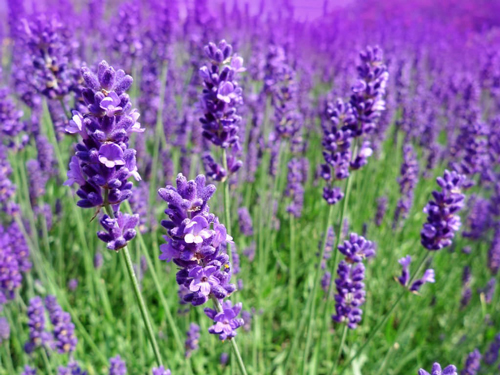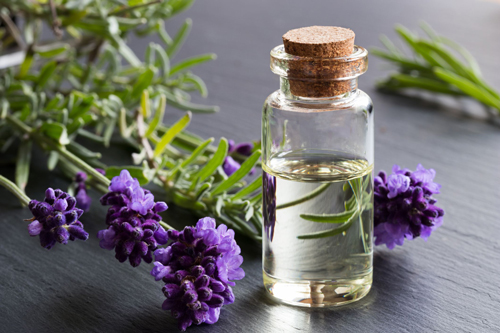Nature’s Alternative To Anxiety and Sleep Drugs Is A Flower
Lavender is not only beautiful, but one of the most medically useful essential oils. Recent research is proving its power and versatility to provide effective and safe alternatives to pharmaceuticals for common physical and psychological challenges.

Lavender: Relaxed and Alert
A remarkable feature of lavender is that it can simultaneously relax you and wake you up. A review of studies on lavender concluded that scenting a room with lavender essential oil can improve feelings of wellbeing, sleep and alertness while decreasing aggression and anxiety (Psychother Res 2002).
This amazing ability of lavender to promote relaxation and alertness simultaneously has been noticed before. In a 1998 study, people given lavender had increased drowsiness, less depression and were more relaxed, but also performed math calculations quicker and more accurately (Int J Neurosci). Another study found that lavender oil made people feel both more active and fresher and more relaxed compared to placebo oil. The lavender also significantly lowered their blood pressure, heart rate and skin temperature (J Med Assoc Thai 2012; 95(4):598-606).
Insomnia, Depression and Anxiety
A small but promising study found that inhaling lavender essential oil is as effective as tranquilizers in helping elderly people with insomnia sleep (Lancet 1995; 346:701).
A double-blind study included 170 people who suffered from restlessness, anxiety, tension, and insomnia. Some were given a placebo; others were given 80mg capsules of lavender essential oil. At the end of the 10 week study, people taking the lavender oil improved their anxiety more than those taking the placebo, according to the Hamilton Anxiety Rating Scale (HAMA). The lavender group’s scores improved from 25.5 to 13.7 while the placebo group improved from 26.5 to 16.9: a significant difference. 48.8% of the lavender group responded versus 33.3% of the placebo group. 31.4% of people on lavender achieved remission from anxiety versus 22.6% on the placebo. Side effects in the 2 groups were comparable, and the lavender—unlike antianxiety drugs—did not cause drowsiness (European Neuropsychopharmacology 2015; doi: 10.1016/j.euroneuro. 2015.07.024).
A review of four controlled studies of seniors confirmed that lavender essential oil is significantly better than a placebo at reducing anxiety (Wien Med Wochenschr 2015; 165(11-12):217-28).
Not only is lavender oil better than a placebo for reducing anxiety, it is as good as the strongest drugs. Lavender oil capsules were compared to the benzodiazepine lorazepam in a six week study of people with Generalized Anxiety Disorder (GAD). The results were the same for both treatments: lavender produced a 45% improvement on the HAMA and lorazepam produced a 46% improvement. Unlike benzodiazepines, the lavender oil was safe, non-sedating and non-addictive (Phytomed 2010;17(2):94-9). Lavender oil is also more effective and safer than the SSRI paroxetine for GAD (Int J Neuropsychopharmacol 2014; 17(6):859-869).
Lavender can also compete with antidepressant drugs. People suffering from depression were given 60 drops of lavender tincture and a placebo or 100mg of the antidepressant drug imipramine and a placebo or 60 drops of lavender and 100mg of imipramine. After four weeks, all three groups improved significantly. The group taking both imipramine and lavender experienced a significantly greater improvement than those taking either treatment alone, suggesting that people on imipramine may be able to reduce their dose of the drug – and, therefore, its side effects – by adding lavender (Prog Neuropsychopharmacol Biol Psychiatry 2003; 27(1)123-7).
And what if you suffer from anxiety and depression? When people with Mixed Anxiety & Depressive Disorder were given 80 mg of lavender oil or a placebo for 70 days in a double-blind study, scores on the HAMA dropped significantly more in the lavender group: 10.8 points versus 8.4. Depression scores also dropped significantly more in the lavender group: 9.2 points versus 6.1. People on lavender had better clinical outcomes and better improvement in daily living skills and quality of life (Eur Neuropsychopharmacol 2016; 26:331–40).
Lavender and Old Age
Many elderly people with dementia manifest agitated behaviour that interferes with daily activities. In a study of people with severe dementia and agitated behaviour, their long stay unit was diffused with lavender essential oil or water. With the lavender, 60% did better than they did with the placebo (Int J Geriatr Psychiatry 2002; 17:305-8).
And when 70 people with dementia – 44 of them with Alzheimer’s – and significant agitation were given lavender essential oil or a placebo oil in diffusers on either side of their pillow while they were sleeping, the agitation decreased significantly in the lavender group, but not at all in the placebo group (Int J Geriatr Psychiatry 2007; 22:405-10).

Lavender and Relationships
In one of the most unusual studies we’ve seen, lavender aromatherapy was shown to improve people’s trust in each other. 90 people played what is known as The Trust Game. Different groups played it in three different rooms: one was lavender scented, one was peppermint scented and one was unscented. Trust scores were significantly higher in the lavender group than in the peppermint group or the placebo group (Front Psychol 2015; 5:1486).
Lavender, Mothers and Babies
After giving birth, many new mothers struggle with poor sleep quality. That struggle to sleep is not only frustrating, it can also contribute to depression and lack of concentration that can affect the mothers’ ability to perform the tasks of daily life. So, a study looked at 158 women who had recently given birth and who had a sleeping disorder. 4 drops of either a 10% lavender essential oil in a sesame seed oil carrier or the sesame seed oil alone were placed on a cotton ball beside their pillow. The women inhaled the aroma in 10 deep breaths before bedtime for four consecutive nights a week for eight weeks. By the end of the study, the improvement in sleep quality was significantly better in the lavender group than in the placebo group (Iran Red Crescent Med J 2015; e25880).
Anxiety, stress and depression during pregnancy can have a negative effect on the health of both mother and child. Researchers asked 141 healthy pregnant women to rub either a placebo cream or a lavender cream onto their legs for 10 to 20 minutes an hour and a half before going to bed in a double-blind study. The lavender cream contained 1.25% lavender essential oil. At the end of the eight week study, there was significant improvement in anxiety, stress and depression in the lavender group compared to the placebo group. By the end of only the fourth week, there was already significant improvement in stress and anxiety (J Caring Sci 2015; 4:63-73).
As for labour itself, a single-blind study of 120 pregnant women shows that inhalation of lavender essential oil significantly reduces labour pain compared to a placebo (Complement Ther Clin Pract 2016; 25:81-86).
And a controlled study found that babies given abdominal massage with diluted lavender oil spend significantly less time crying from colic (Int J Nurs Practl 2012; 18(2):164-169).
Lavender and Hormonal Problems
A double-blind study found that lavender aromatherapy significantly reduces hot flashes when given to menopausal women for 20 minutes twice a week for 12 weeks. The women in the lavender group had 10.58 hot flashes a week compared to 19.7 a week in the placebo group (J Chin Med Assoc 2016; 79(9):489-492).
Lavender aromatherapy may also offer help to women suffering from PMS (Biopsychosoc Med 2013; 31; 7(1):12) and painful periods (Pain Manag Nurs 2012;13(4):236-40). When 80 women used a lavender essential oil aromatherapy massage during the first days of menstruation, there was a significant decrease in menstrual pain 30 minutes later compared to a placebo oil massage (Iran J Nurs Midwifery Res 2015;20(1):156-60).
Lavender and the Hospital
Lavender’s soothing properties can also help soothe pain: specifically post-operative pain. A study included 50 people who had just undergone open-heart surgery. Some of them received oxygen through a breathing face mask for 15 minutes and some of them had 2% lavender essence in an olive oil carrier mixed in with the oxygen. At each time after the 15 minute intervention the people were tested – 5 minutes, 30 minutes and 60 minutes – the lavender group had significantly less severe pain (Adv Biomed Res 2015; 4:127).
Patients in hospitals often suffer from pain, nausea and anxiety that require treatment. But those treatments have side effects and are often ineffective. In an uncontrolled study, patients given lavender aromatherapy had reductions in anxiety (Complement Ther Med 2016; 25:164-169). In patients about to undergo open-heart surgery, inhaling lavender oil reduced anxiety by 10% more and decreased cortisol by 69.9% more than inhaling a water placebo, again showing its antianxiety properties (Iran J Nurs Midwifery Res 2016;21(4):397-401). Other research has also shown that lavender aromatherapy can significantly reduce stress and the pain from inserting a needle (J Altern Complement Med 2011; 17(9):823-826).
Finally, a group of 60 coronary artery disease patients in ICU who inhaled lavender essential oil had significantly improved sleep quality and anxiety compared to a control group (Nurs Crit Care 2017; 22(2):105-112).
yogaesoteric
March 30, 2019
